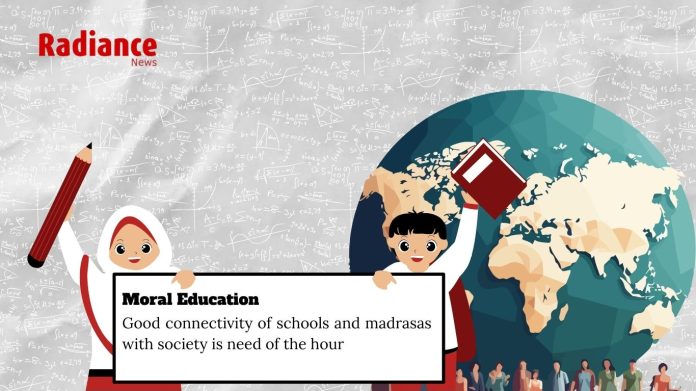
The Mudaliar Commission penned down its view on this critical issue as far back as 1953. Even after more than half a century, our schools and madrasas do not seem to have the desired impact on their immediate social environment or society. An interesting example of the impact of the school on society comes from the European country of Iceland. Iceland is said to be a country where environmental protection is taken very seriously. Schools also undertake many activities related to it.
A group of students there observed that toothpaste is packaged in small cardboard boxes. They felt that toothpaste also be sold without boxes. Students calculated the average number of toothpaste boxes sold per month in their country. How much wood would be required to make so those many cardboards? How many trees will have to be cut to get (that amount of) wood? They presented this calculation objectively to the government and demanded the government ban toothpaste boxes made from cardboard. This is a good example of the fruitful connection between the school and society.
In our society, there are very few examples of good connectivity between schools/ madrasas with society. Sometime back, a communal incident took place in an important city of the country. Pointing out this incident, a friend observed, “An important madrasa of our country is located in this area.” But the sad reality is that this madrassa has not been able to exert any significant influence on the surrounding area and its residents. In light of my friend’s comment, we can make a reasonable estimate about the condition of the neighbouring houses and residential blocks surrounding the schools and madrasas of the Muslim community.
Do schools and madrassas try to influence and change their surroundings? Moreover, if so, how successful have those efforts been? If the educational institutions of the Muslims had connected themselves with society, the situation in our country might have been different. A Muslim school is located in an area of a mixed population in the city of Bengaluru, India. This school attempted to connect itself with society. Their efforts paid dividends. The school got an excellent response and good results. On Eid-ul-Fitr, the students of the school distributed “sheer khurma” (a popular sweet dish) along with some handbills/pamphlets conveying basic information about Ramadan Eid among the non-Muslims living around the school. If the Muslim community connects its schools and colleges with society, it is hoped that it will have a positive impact.
The Mudaliar Commission had pleaded for starting this process. By the way, this recommendation is part of and mentioned in all education policies so far. However, the implementation is zero.
Under the same sub-topic, the Mudaliar Commission suggested that a “National Character” and a “National Tradition” should be formulated. National character is not defined here. The national character should not imply nationalism. The National Education Policy 2020 talks about nationalism. The journey from national character (Mudaliar Commission 1953) to nationalism (under the NEP 2020) has been traversed by riding the “Hindutva” wave in the field of education. The debate on whether the moral education of students needs “national morals” or “morals that imbibe nationalism” should be taken up by academia.
The Mudaliar Commission recommended a holistic approach to moral education. The National Education Policy 2020 also presents the same concept. However, the policymakers of NEP 2020 have made it a key feature of their document. Explaining the program of inclusiveness, the Mudaliar Commission said that all activities like curricular, co-curricular and sports in the school should include the element of moral education. The Mudaliar Commission believed that students should be trained to have high morals and good character for the collective struggle required in the process of nation-building.
The Commission advocated the teaching of morals to be made an integral part of every subject especially the teaching of social studies, whose main objective is turning students into better citizens of the country.
The Commission was not in favour of “moral science” being a separate and stand-alone subject. It advocated the teaching of morals to be made an integral part of every subject especially the teaching of social studies, whose main objective is turning students into better citizens of the country. The individual and collective behaviour of children in school should reflect moral education.
Role of teachers
Each commission has identified the role of teachers as fundamental in moral education. Instead of merely being an agent of information transfer, they are described as role models and mentors. Most reviews (of the education system and education policies) have lamented that teachers are not performing their intended and true role. The report of the Mudaliar Commission also holds the same impression. It asked teachers to recall their original purpose and discharge their responsibilities accordingly.
Religion and Moral Education
On page 105 of the Commission’s report, under the above sub-topic, the Commission, while presenting its views, has written that the foundations of moral education are connected with religious education. The commission has clarified that religion does not interfere in our system of governance, but religious education is the only effective tool for making good citizens.
Regarding religious education, the Commission has spoken neither of “Sarva Dharma Sambhava” nor of ancient Indian customs, but the Commission has clearly stated that students should be taught their religion. In particular, it is important to teach and imbibe the moral system of religion in the students. For this system, the commission said that religious education should be organized separately from the school schedule and taught only to those students who are interested in it. Support can be obtained from local religious figures, religious communities and institutions for the management of religious education.
Acting on this premise, when the BJP government was first formed in Karnataka in 2008, a circular was issued by the government to high schools that the Gita would be taught to students after school hours. By discussing with the state governments, a similar possibility can be explored for Islamic education as well. Due to the lack of knowledge of the policies and decisions of the government, minority institutions are unable to provide religious education in their schools at some places.



